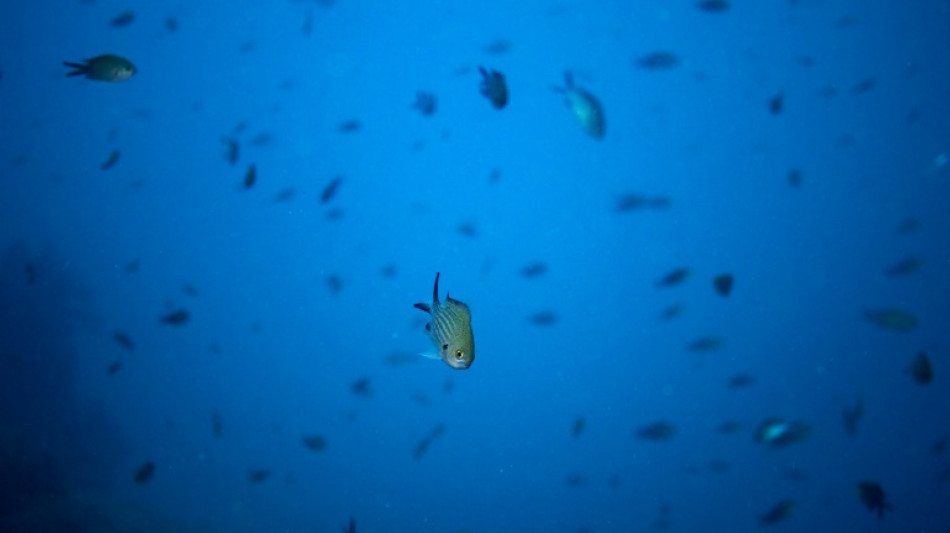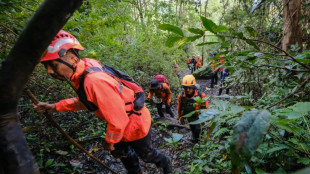
-
 France's Moutet booed for underarm match point serve in Melbourne
France's Moutet booed for underarm match point serve in Melbourne
-
Zverev happy with response after wobble in opening Melbourne win

-
 'Bring it on': UK's Labour readies for EU reset fight
'Bring it on': UK's Labour readies for EU reset fight
-
New Zealand's Wollaston wins again to lead Tour Down Under

-
 Zverev wobbles but wins at Australian Open as Alcaraz enters fray
Zverev wobbles but wins at Australian Open as Alcaraz enters fray
-
British qualifier upsets 20th seed Cobolli to make mum proud

-
 Zverev drops set on way to Australian Open second round
Zverev drops set on way to Australian Open second round
-
Indonesian rescuers find debris from missing plane

-
 Wembanyama scores 39 as Spurs overcome Edwards, Wolves in thriller
Wembanyama scores 39 as Spurs overcome Edwards, Wolves in thriller
-
Heartbreak for Allen as Broncos beat Bills in playoff thriller

-
 British qualifier upsets 20th seed Cobolli in Melbourne
British qualifier upsets 20th seed Cobolli in Melbourne
-
Paolini races into round two to kickstart Australian Open

-
 Portugal presidential vote wide open as far-right surge expected
Portugal presidential vote wide open as far-right surge expected
-
Lutz kicks Broncos to overtime thriller as Bills, Allen fall short

-
 Marchand closes Austin Pro Swim with 200m breaststroke win
Marchand closes Austin Pro Swim with 200m breaststroke win
-
Raducanu says Australian Open schedule 'does not make sense'

-
 Australia great Martyn says he was given '50/50 chance' of survival
Australia great Martyn says he was given '50/50 chance' of survival
-
Top-ranked Alcaraz, Sabalenka headline Australian Open day one

-
 Haiti security forces commence major anti-gang operation
Haiti security forces commence major anti-gang operation
-
NFL's Giants ink John Harbaugh as new head coach

-
 Skipper Martinez fires Inter six points clear, injury-hit Napoli battle on
Skipper Martinez fires Inter six points clear, injury-hit Napoli battle on
-
NASA moves moon rocket to launch pad ahead of Artemis 2 mission

-
 Silver reveals PSG talks over NBA Europe plan
Silver reveals PSG talks over NBA Europe plan
-
Iran leader demands crackdown on 'seditionists' after protests

-
 Carrick magic dents Man City Premier League bid as Arsenal held
Carrick magic dents Man City Premier League bid as Arsenal held
-
Kane scores as Bayern deliver comeback romp over Leipzig

-
 Arteta angry as Arsenal denied penalty in Forest stalemate
Arteta angry as Arsenal denied penalty in Forest stalemate
-
Glasner feels 'abandoned' by Palace hierarchy

-
 Israel objects to line-up of Trump panel for post-war Gaza
Israel objects to line-up of Trump panel for post-war Gaza
-
Dupont guides Toulouse to Champions Cup last 16 after Sale hammering

-
 Arsenal extend Premier League lead despite drawing blank at Forest
Arsenal extend Premier League lead despite drawing blank at Forest
-
Kane scores in Bayern comeback romp over Leipzig

-
 Skipper Martinez fires Inter six points clear, Napoli squeeze past Sassuolo
Skipper Martinez fires Inter six points clear, Napoli squeeze past Sassuolo
-
Lookman gives Nigeria third place after AFCON shoot-out with Egypt

-
 Thousands march in France to back Iranian protesters
Thousands march in France to back Iranian protesters
-
Egadze glides to European figure skating gold

-
 Lens hold off Auxerre to retake top spot from PSG
Lens hold off Auxerre to retake top spot from PSG
-
Trump threatens Europe with tariffs over Greenland as protesters rally

-
 EU, Mercosur bloc ink major trade deal, reject 'tariffs' and 'isolation'
EU, Mercosur bloc ink major trade deal, reject 'tariffs' and 'isolation'
-
Feinberg-Mngomezulu captains Stormers into Champions Cup last 16

-
 Hundreds in London protest against Beijing 'mega embassy'
Hundreds in London protest against Beijing 'mega embassy'
-
Man Utd hurt City title hopes as Spurs flop again

-
 Last-gasp Can penalty gives Dortmund win against St Pauli
Last-gasp Can penalty gives Dortmund win against St Pauli
-
Greenland protesters tell Trump to keep US hands off Arctic island

-
 Skipper Martinez fires Inter past Udinese and six points clear
Skipper Martinez fires Inter past Udinese and six points clear
-
Carrick urges consistency from 'fantastic' Man Utd after derby win

-
 Man City well beaten by 'better' Man Utd, concedes Guardiola
Man City well beaten by 'better' Man Utd, concedes Guardiola
-
Real Madrid overcome Bernabeu boos to record Arbeloa's first win

-
 Trump invites more leaders to join Gaza 'Board of Peace'
Trump invites more leaders to join Gaza 'Board of Peace'
-
Man Utd dominate Man City in dream start for Carrick


Mysteries and music: listening in to underwater life
When marine researchers started recording sounds in the seagrass meadows of the Mediterranean Sea they picked up a mysterious sound, like the croak of a frog, that resounded within the dense foliage -- and nowhere else.
"We recorded over 30 seagrasses and it was always there and no-one knew the species that was producing this kwa! kwa! kwa!" said Lucia Di Iorio, a researcher in ecoacoustics at France's CEFREM.
"It took us three years to find out the species that was producing that sound."
The melodious songs of whales might be familiar music of the world's underwater habitats but few people will have heard the hoarse growl of a streaked gurnard or the rhythmical drumbeat of a red piranha.
Scientists are now calling for those sounds and many thousands more to become more widely accessible.
They say a global database of the booms, whistles and chatter of the sea will help to monitor diversity in aquatic life -- and help put a name to mystery sounds like the one Di Iorio and her colleagues investigated.
Experts from nine countries are working to create what they have dubbed the Global Library of Underwater Biological Sounds -- or "GLUBS".
This would gather together recordings held all over the world and open them up to artificial intelligence learning and mobile phone apps used by citizen scientists.
While experts have been listening to life underwater for decades, the team behind GLUBS say that audio collections tend to be narrowly focused on a specific species or geographical area.
Their initiative is part of burgeoning work on marine "soundscapes" -- collecting all the sounds in a particular area to discern information about species types, behaviour and overall biological diversity.
Scientists say these soundscapes are a non-invasive way to "spy on" life underwater.
In a paper published recently in the journal Frontiers in Ecology and Evolution, the GLUBS team said many fish and aquatic invertebrates are mainly nocturnal or hard to find, so acoustic monitoring could help conservation efforts.
"With biodiversity in decline worldwide and humans relentlessly altering underwater soundscapes, there is a need to document, quantify and understand the sources of underwater animal sounds before they potentially disappear," said lead author Miles Parsons of the Australian Institute of Marine Science.
- Sonic 'barcode' -
Scientists believe that all 126 marine mammal species emit sounds, as do at least 100 aquatic invertebrates and some 1,000 fish species.
The sounds can convey a wide range of messages -- acting as a defence mechanism, to warn others of danger, as part of mating and reproduction -- or just be the passive noise of an animal munching a meal.
Di Iorio, a co-author on the GLUBS paper, said while marine mammals, like humans, learn their language of communication, the sounds made by invertebrates and fish are "just their anatomy".
Many fish produce a distinctive drumming sound using a muscle that contracts around their swim bladder.
"This dum-dum-dum-dum-dum, the frequency, the rhythm and the number of pulses vary from one species to another. It's very specific," Di Iorio told AFP.
"It's like a barcode."
Scientists can recognise families of fish just from these sounds, so with a global library they might be able to compare, for example, the thrumming calls of different grouper fish in the Mediterranean to those off the coast of Florida.
But another key use for the library, they say, could be to help identify the many unknown sounds in the world's seas and freshwater habitats.
- Mystery music -
After many months investigating the strange seagrass croaker, Di Iorio and her colleagues were able to point the finger of suspicion at the scorpionfish.
But they struggled to explain how it was making such an unusual noise -- and it refused to perform for them.
They tried catching the fish and recording it in a carrier. They sunk sound equipment onto the seabed next to the fish. They even listened in to aquariums that contained scorpionfish.
"Nothing," she said.
Eventually colleagues from Belgium took a camera that could record at low light and staked out some seagrass in Corsica.
They were able to capture the kwa! kwa! sound as well as video of the fish making a shimmying motion.
Back in the lab, they dissected a scorpionfish and found that they have tendons strung along their bodies.
Their hypothesis is that the fish contracts these muscles to produce the sound.
"It's a guitar, an underwater guitar," said Di Iorio.
But there are many more mysteries where that came from.
Di Iorio said in the Mediterranean, up to 90 percent of noises in a given recording might be unknown.
"Every time we put a hydrophone in the water we're discovering new sounds," she added.
F.Pavlenko--BTB




